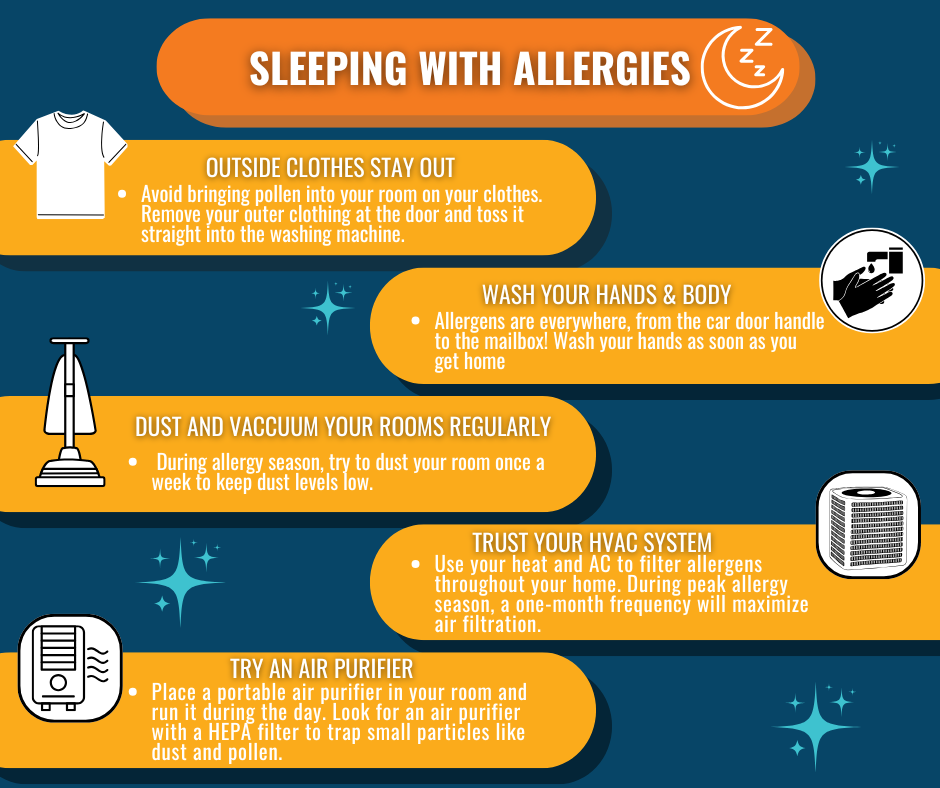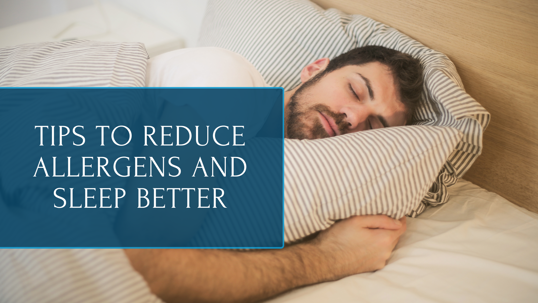Allergy sufferers in Millbrook and the surrounding area know the terrors of nighttime allergies: wheezing, coughing, tossing, and turning.
Especially during allergy season, it’s essential to address all possible environmental irritants and indoor allergens, not just pollen. Learn how to reduce dust, dander, and more in your bedroom for a better night’s sleep. Breathe easier with just a handful of changes to your routine.
Allergies and Sleep: What’s the Connection?
If you have seasonal or environmental allergies, you know how sneezing, coughing, and sinus pressure can affect your sleep. Considerable research links allergies to poor-quality sleep, which contributes to daytime fatigue and an increased risk of developing a sleep disorder.
In addition to working with their doctor, roughly40% of Americans with seasonal allergies can benefit from habits that reduce their exposure to allergens in the home.

![]()
How to Tackle Allergies in Your Bedroom
1. Keep Pollen Out
During allergy season, keep windows and doors closed, especially from late morning to early evening when pollen levels peak.
2. Shower Up
When you get home, remove your outer layers of clothing at the door and shower to wash pollen off your skin and hair.
3. Prevent Dust Accumulation in the Bedroom
Dust and vacuum your bedroom weekly to stay ahead of dust, pollen, and dirt. You may need to dust your bedroom every other day if you have severe allergies.
4. Keep Fido Out of Your Bedroom
Provide your pet with a cozy place to sleep in a separate room or at least on the bedroom floor to prevent pet hair or dander accumulation.
5. Maintain Your HVAC System
A well-maintained HVAC system is the most effective tool for filtering indoor air throughout your home. Replace your air filter every 1-3 months and schedule annual maintenance to ensure your unit works efficiently.
6. Use an Air Purifier
Air purifiers filter indoor air and improve circulation, lowering the concentration of allergens in your bedroom. Choose a portable unit with a HEPA filter, which is rated to trap the smallest airborne particulates.
Where Should I Place My Air Purifier in My Bedroom?
The best place for an air purifier is in the center of the room, where it is unobstructed. Place the unit on a slightly elevated object, such as a sturdy shoebox, to raise it off the ground. A good rule is that if you can see it from all the corners of the room, it’ll be able to filter the air effectively.
Read More: How to Improve Indoor Air Quality Problems
Do Allergy Symptoms Get Worse at Night?
It’s not just you. Allergy symptoms often worsen in the evening when you’re headed to bed because of:
- Histamine levels – Histamine is the chemical produced in the body that triggers allergy symptoms. Histamine levels tend to peak in the evening.
- Pollen levels – Pollen brought in off your clothes or through an open door will settle. Getting ready for bed can disturb the particles in the space.
- Body position – Lying down changes how mucus moves in your sinuses. This can cause mucus to gather in your nasal passages, leading to sneezing and coughing.
- Temperature changes – Temperature and humidity changes may affect nasal mucus production, contributing to irritation and post-nasal drip.
Does Sleeping with a Humidifier Help Allergies?
Some individuals benefit from using a humidifier during allergy season, but it’s not a universal solution. A portable humidifier can thin out mucus and moisturize nasal passages, making breathing easier. However, too much humidity can promote mold and mildew growth. Keep your home’s humidity level between 30% and 50% for optimal indoor air quality.
Take On Allergy Season with Help from AirNow Home Services
Montgomery families turn to the professionals at AirNow Home Services for indoor air quality solutions. Our trained, reliable technicians will ensure that your HVAC system maintains clean, healthy air for your family.
Call 334-384-6050 or contact us online to schedule HVAC, electrical, or plumbing services in Montgomery, Millbrook, Prattville, and the surrounding areas of Alabama.

